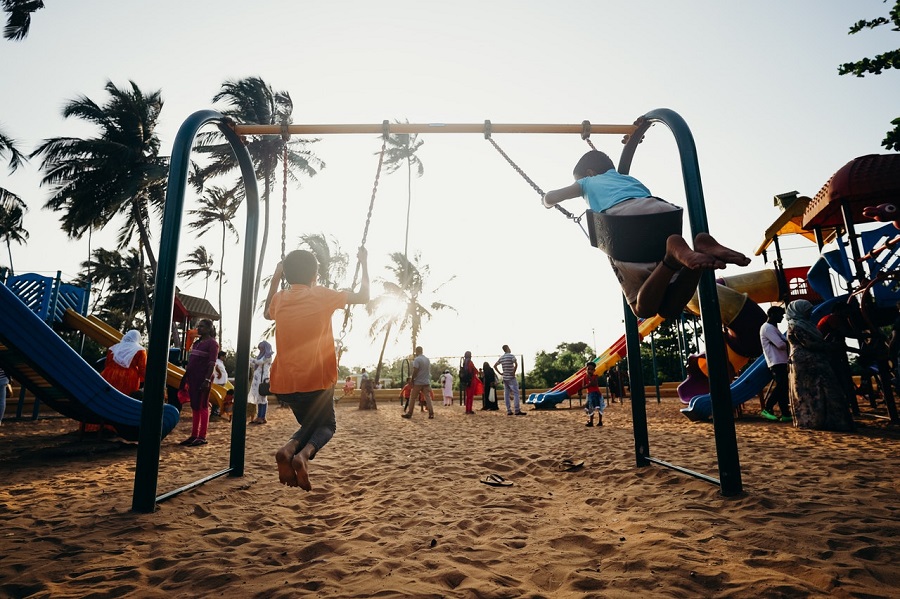4 Tips to Keep Your Child Safe on the Playground

One of the best ways to keep your children entertained and in the fresh air is by taking them to the playground. Playgrounds are places where they can meet other children, boost the development of their motor skills and coordination, and it also teaches them how to play safely.
There’s no doubt about it, playgrounds are important as they help kids develop various skills that they will use throughout life. However, it’s not a secret that accidents and injuries can occur even on the playground. From faulty equipment to lack of proper supervision, accidents and injuries are sometimes a given. Most of the time these injuries are superficial cuts and bruises, but serious ones can also occur.
Preventing these serious injuries is what every parent wants and you can by simply following these couple of tips that will help you keep your child safe on the playground.
1. Choose the right playground
When we say that you should choose the right playground we mean the safest one that you can find in your area. Before ever taking your child to the playground, check to see how secure it is – how close it is to the road, what kinds of equipment it has, and what’s the state of the said equipment, what kind of surface it has, and is it clean enough.
All these things matter when you’re taking your child to a playground. You wouldn’t want your child to play on a playground full of litter just like you wouldn’t want your child to play on broken equipment.
2. Is the playground age-appropriate for your child
There are all kinds of playgrounds out there and sometimes they aren’t really appropriate for small children.
Avoid taking really small children to playgrounds that have concrete or asphalt surfaces – there are more chances that the child will get hurt. Instead, choose playgrounds where the surfaces are gravel, sand, shredded rubber, or any other shock-absorbent surfaces.
The same goes for playground equipment. Usually, you’ll see that the playground has separate areas for younger children (ages 2 to 5), and the equipment there is age-appropriate. Children ages 5 and older will have playground equipment designed for older kids and so on.
The point is to be aware of the type of playground equipment you’re letting your kids play on. If the child is using the equipment not meant for a child of their weight and height, there are greater chances of injury.
3. Talk to your child before going to the playground
It’s important to always talk to your child before going to any playground. Set rules and tell them what they aren’t allowed to do. Also, warn them about the potential dangers of being on the playground.
All kinds of things are happening on the playground, and sometimes it’s too hectic – this is why it’s important to tell your child to always be alert and to be aware of their surroundings.
You should also teach your child that this is the perfect place to be patient and to allow other kids to play with them and on different playground equipment. Also, warn them about ‘stranger danger’ and what can happen if they talk with a stranger.
Only after all the rules have been laid out can you take your child to the playground and of course, once there look closely to see if your rules are being followed.
4. Supervision is always important
It only takes a moment of distraction for the disaster to strike, especially where the children are concerned. This is why it’s crucial to always be alert and keep an eye on your children when on the playground.
With proper supervision, you can avoid potential injuries and you can stop your child from wandering off the playground. If you have a small child make sure you are always within arm’s reach of them. Older children won’t like you hovering over them so give them space but keep an eye on the situation at all times.
Always step in when you notice the potential danger. Similarly, your presence will be welcomed to break a fight or if bullying happens – these things, unfortunately, tend to happen on the playgrounds.
Many parents are still sceptical about taking their children to playgrounds. But playgrounds are essential for children’s social and overall development. They are entertaining and they keep your children active while being outdoors.
You as a parent or a caregiver should teach them how to behave when on the playground, what is allowed, and what is a deal-breaker. Additionally, your presence and supervision are what will make any visit to the playground safe and secure.